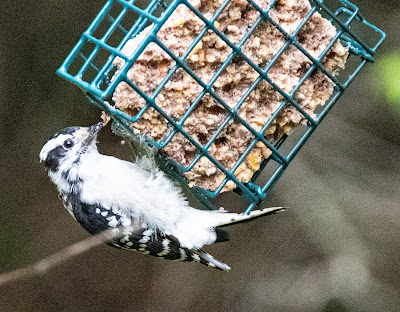 |
| Dotty, the downy woodpecker at my feeder |
I am sitting here on my deck in the dappled sunlight, the breeze blowing through my hair, barefoot in a trance. A profound peacefulness reigns, a sense of contentment, a feeling of belonging, of being grounded – all of this orchestrated by a downy woodpecker swinging from the suet cage in my crabapple tree. Her name is Dotty.
It dawns on me that I have been missing in action as of late, too busy to be grounded in the really real, too caught up in the daily political dramas. All of which distracted me and, I can see now, hurt me, absorbing me deeper into theWorld Wide Web and the nonstop yearnings of our 24/7 consumer culture.
I experienced a glimpse of a deeper, more complete world just now on my deck, a state of silence described well by Eckhart Tolle: “You are present. You have stepped out of thousands of years of collective conditioning1, As I sat there, I could feel the gears in my head stop grinding from thinking too much.
I should know better by now from lessons learned in “Be Here Now,” written in the 1960s by Ram Das. He made abundantly clear that “Meditation goes beyond the thinking mind….[illuminating] the truth that who you really are is more than who you think you are.”2
For a blessed moment, I removed myself from the cacophony of civilization and joined Dotty’s world. I had no choice. Starting a few days ago, she started audaciously knock, knock, knockin’ on my door – actually the wall above the door.
She wasn’t kidding!
She proceeded to punch a series of holes, one directly under the other, straight through the one-inch, rough-sawn pine boards that clad my home. The pile of wood chips was starting to pile up on my front stoop. I had to do something.
I hung up some suet to pacify Dotty and withdrew to my deck to relax. That’s when I fell into the trance already mentioned, while Dotty celebrated her victory: wakening me up to the present moment while getting fed a treat.
I don’t do Facebook or Twitter, yet I can see now I’ve spent too much time watching the news and listening to talking-heads bloviate about the cacophony of crises that confront us. Altogether, electronic media combined with excess thinking had abstracted my being. I was unaware of the consequences: These entrancing flickering screens were grooming me for Mark Zuckerberg’s Metaverse.
It took Dotty to show me that his virtual world is a phantom cloud without substance, separating me from my true self. I, of all people, should know better from being a long-time fan of Charlene Spretnak, who convincingly makes the case that only three things are really real: our body, nature, and sense of place.3
Of course, that doesn’t mean I can ignore the outside world, but the balance has been lost. It has made me ungrounded, distracted, and disoriented, progressively unable to be truly present with my friends, Dotty, or the earth itself.
After meditating on the deck, I felt life ebbing back into my bones, which spurred me to write this essay. All I needed to finish was a snappy ending. Going back inside the house – as if by synchronicity – I found what I needed in an email that had just arrived from a trusted friend: It was a Taoist parable about how to find meaning in life.
“During a time of great drought, a Taoist master was asked by members of a village if he could help bring rain to their dry fields… The master agreed to come and asked for a small hut with a garden that he could tend. For three days, he tended the garden, performing no special rituals…”
“On the fourth day, rain began to fall on the parched earth.” But the master refused to take responsibility. Instead, “he explained, when he came to the village, he had sensed disharmony within himself. Each day, as he tended the garden, he returned a little more to himself. When he returned to balance, the rain came naturally.”4
It is said this was one of the favorite stories of Carl Jung, the legendary psychologist. I’m not surprised because he believed nothing was a coincidence – including what happened to the farmers in the parable or to the woodpecker and me. Instead, he thought that the inner attitude of a person is inseparable from events taking place in the world. He called this psychological principle synchronicity.
Dotty and I are true believers.
xxx
1 “Stillness Speaks” by Eckhard Tolle. Gale Engage Learning. 2003. page 23.
2 “Polishing the Mirror,” by Ram Das. 2014. Sounds True, Boulder CO. page 1
3 “The Resurgence of the Real” by Charlene Spreknak. Addison-Wesley Publishing Company. 1997
4 https://www.huffpost.com/entry/a-taoist-parable_b_10007270
Thank you, Jean.
ReplyDelete